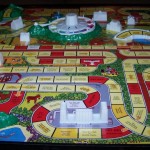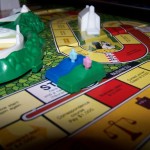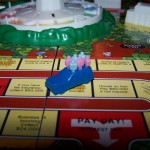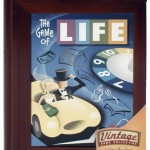 The Game of Life, or sometimes just called LIFE, was originally created in 1860 by Milton Bradley and it looked absolutely nothing like the game we know today. It was a modified checker board and included a six-sided teetotem instead of dice. You tried to land on “good” space and collect a total of 100 points, you could earn 50 by reaching the final “Happy Old Age” square. But in 1960, on the 100th anniversary of the game, it was redesigned and re-released in the form that we know it today. The teetotem was replaced with a spinner wheel for movement and a winding track that included three-dimensional elements: bridges, mountains and buildings. And the points system for scoring was replaced with money. Players are given start-up money, a car and a peg, representing them, to drive the car. And away they go.
The Game of Life, or sometimes just called LIFE, was originally created in 1860 by Milton Bradley and it looked absolutely nothing like the game we know today. It was a modified checker board and included a six-sided teetotem instead of dice. You tried to land on “good” space and collect a total of 100 points, you could earn 50 by reaching the final “Happy Old Age” square. But in 1960, on the 100th anniversary of the game, it was redesigned and re-released in the form that we know it today. The teetotem was replaced with a spinner wheel for movement and a winding track that included three-dimensional elements: bridges, mountains and buildings. And the points system for scoring was replaced with money. Players are given start-up money, a car and a peg, representing them, to drive the car. And away they go.

There are many versions of The Game of Life available. For our game, we played the Target exclusive Vintage Game Classics edition. We bought it, and others in this series, because of the look of the box. It makes for a better display than a traditional cardboard board game box. Of course, the trade-off of the nifty and compact design is that it takes longer to set up. Other versions you just unfold the board and are done. This one you have to unfold the board (eight sections instead of two) and then put all the buildings, mountains and bridges on it, and the spinner. The design is nice, but it makes for a spinner that is less stable – it works, just don’t get crazy with it. Since it was the first time we’d opened this box, we also had to unwrap all the money and bank notes, as well as separate the little plastic people, which in the old days were just straight pegs but now have little arms down the side. My wife decided to be female and chose a pink peg. I decided to be male and chose a pink peg.
We read the rules. Neither of us had played the game in years and we felt certain that there had been some house rules in play, so we decided to stick to the printed rules for our game. I switched my pink peg for a blue one, because the rules state that males are blue and females are pink. It seems The Game of Life is pretty set into its gender roles, although it really doesn’t matter because they’re just pegs on a game board and not a judgement of the players. They could be green pegs and it wouldn’t make a lick of difference. But I digress…
So we spin the wheel and I get the lowest roll, I’m the banker. I control ALL THE MONEY! (Wife: Just like real life.) Hey, do you want to do the math? (Wife: Do you want me to do the math?) No. I set up the bank and give each of us $10,000 to start. We put our cars on the board and spin to see who goes first. (Wife: I win!)
I explain the rules of the board. Yellow squares you do only if you land on them, same as Gold squares. Red squares you have to do as you pass, no choice. And White squares you CAN do if you want as you pass.
Immediately I recall the house rules of youth as we take our early turns. She gets her career, a physician, and heads out. (Wife: I also caught an escaped lion!) I get my career, a journalist, and land on the tornado square that makes me go back to the start. In the old days we tried to hit this spot because we let that person get two jobs! But that’s actually against the rules.
We both bought auto insurance at the start, and we bought life insurance as we pass it. And they work in-game just like in real life, sort of. You buy them and then if nothing ever happens to you it seems like a waste of cash, but if you don’t have them and land on one of those squares it can be very expensive. Unlike real life though, you don’t have to keep paying for it. Oh, and I also captured an escaped lion. (Wife: I think they need to hire better zookeepers.)
You have to get married. You cannot play, nor win, at Life unless you get married. The game takes no position on gay marriage, however specifically states that if you get sent back past the marriage spot you cannot get married again. (Wife: No Big Love or Sister Wives.) No divorce either. The Game of Life is very optimistic in some respects.
(Wife: Lucky Day!) In one of the strange rules of the game, landing on a Lucky Day spot you get $20,000 from the bank, which you can keep or spend on two numbers and spin for a chance to win $300,000. (Wife: I bet the money every time.) And you lost every time. (Wife: I know.) Which is why I’m in charge of the money. (Wife: Shut up.)
We both buy stock. There are some rules about playing the market, she does it twice and I never do. (Wife: Playing the market sucks.) Just like real life! The only reason I bought stock is because of squares that state “If you own stock…” and then you collect a bunch of money. Completely not like real life.
At various places in the game you can get kids, either by having them or adopting them. At one point I have to choose between having a daughter or collecting $480,000. I choose the daughter. I am an idiot. Because I’m obsessed with science fiction, I keep track of my “other path” the rest of the game. Alternate Reality me is rich, handsome and a world traveler. I have 4 kids, took a vacation on a polluted lake and had a millionaire take revenge on me. (Wife: hehe!) A pox on the 1%! Occupy the Game of Life! (Wife: I have a gold mine!) Shut up. I discovered Atlantis! (Wife: I won the Nobel Peace Prize!) I went fishing. (Wife: I went to the Arctic!) We digress…
She crosses the bridge first, which means that when I eventually catch up I’ll have to pay the toll. She also lands of the Day of Reckoning first, obviously. (Wife: I win!) Not yet. She gets $96,000 for her 2 kids. She spins and crosses into Millionaire. (Wife: I win!) Nope. She spins one more time for her lucky number, which for the rest of the game I have to pay her if I spin it. (Wife: Why didn’t I win?) Because I’m not dead yet, and it’s the person with the most money when they die that wins. (Wife: Really?) No. But also, yes.
I finally drag myself across the finish line. I earn $192,000 for my 4 kids. We both get $120,000 for owning stock, $8,000 for having life insurance, and we count up the money. (Wife: I win!) She wins. (Wife: I win!) You said that already. (Wife: I know … I win!)
Final tally:
Me – $1,117,000
Her – $1,825,000
The primary problem with The Game of Life is that if the first person across the finish line doesn’t go for Millionaire Tycoon and win, then it just sort of drags out. Eventually everyone crosses the finish and we go into accounting, and only after the mathematics is done do we know who won. Kind of a wimpy end for the game.
The second problem with this game is that it is extremely linear with almost no choices for the player. There are only 3 places where you can choose between two paths, and the final Tycoon choice. The game has rules where you can spend money of wheel spins. It gives you the opportunity to lose lots of money, but playing straight through it’s pretty much just luck of the spin.
The game plays better with more players. Being linear and having a rule that two players can’t be on the same space matters more when the chance of it happening is higher. I’d recommend at least 4 players, and the game comes with 6 cars.
Anyway…
Man, 0. Wife, 1.
(Wife: I win!)





